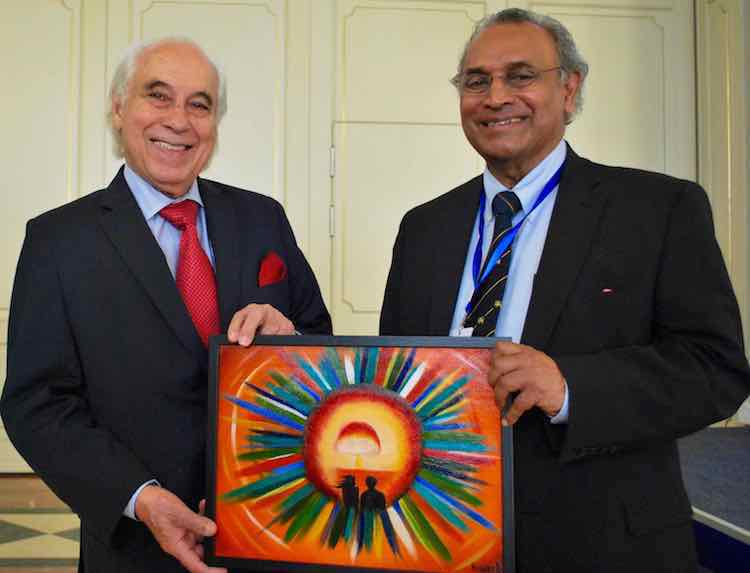By Sergio Duarte, President of Pugwash
NEW YORK (IDN) – For the third time since the creation of the Nobel Peace Prize a civil society organization dedicated to nuclear disarmament has received this prestigious honor. The 2017 Prize has been awarded to the International Campaign to Abolish Nuclear Weapons (ICAN), a coalition of non-governmental organizations in 101 countries launched in 2007. Before ICAN, International Physicians for the Prevention of Nuclear War (IPPNW) and Pugwash Conferences on Science and World Affairs also were recipients of the Prize, respectively in 1985 and in 1995 for their actions in favour of peace and nuclear disarmament.
The Norwegian Nobel Committee recognized that in the past decade ICAN has been a decisive force in the efforts to achieve a world without nuclear weapons. It was particularly active during the preparation and the run-up to the Conference convened by the United Nations General Assembly to negotiate a legally binding instrument to prohibit nuclear weapons, leading towards their elimination.
This instrument, adopted on July 7 2017, prohibits the development, testing, production, acquisition, possession, stockpiling, using or threatening the use of nuclear weapons. It also bans the deployment of nuclear weapons in the territory of other States and obliges its Parties to provide assistance to individuals affected by the use or testing of nuclear weapons as well as to take measures of environmental remediation in areas contaminated as a result of such tests. Moreover, it provides a path to further measures to abolish atomic arms.
In his congratulatory statement the Secretary General of the United Nations called on all countries to show vision and greater commitment to a world free of nuclear weapons. The award of the 2017 Nobel Peace Prize reflects the growing global recognition that a ban on nuclear weapons is an integral part of the normative framework necessary to achieve and maintain a world free of such arms.
The prohibition and elimination of atomic weapons has been the subject of international debate at the United Nations since the first Session of the General Assembly in 1946, which adopted resolution no. 1 providing for the establishment of a Commission “to make specific proposals for the elimination from national armaments of atomic weapons and all other major weapons adaptable to mass destruction”.
Based mainly on humanitarian considerations, bacteriological weapons were abolished in the 1970’s and chemical weapons were banned in the 1990’s. Concrete progress toward the establishment of legally binding and irreversible multilateral commitments to abolish nuclear weapons, however, has eluded the international community since such arms began proliferating in 1945.
The elimination of nuclear weapons is a common objective of many international treaties in the field of disarmament and non-proliferation. Costa Rica and Malaysia proposed a draft Nuclear Weapons Convention in 1997 and updated it in 2007. Former Secretary General of the United Nations Ban Ki-Moon brought this idea again to the fore in his 5-point nuclear disarmament plan in 2008. All States agree on the need to eliminate all weapons of mass destruction, including nuclear weapons, an objective also recognized in the Treaty on the Non-proliferation of Nuclear Weapons (NPT) and other important multilateral instruments.
The award of the 2017 Nobel Peace Prize represents a well-deserved acknowledgement of the leading role played by ICAN to help break the current deadlock in the multilateral disarmament forums and of its decisive impact on the series of events that culminated in the adoption of the Treaty on the Prohibition of Nuclear Weapons.
Despite the importance of this achievement, there is still much to be done in order to find a workable convergence between the existing normative basis on nuclear weapon issues and the new prohibition embodied in the Prohibition Treaty. Governments and civil society organizations involved in the campaign know that the new instrument will not make nuclear disarmament happen in the short run but are convinced that it will make its urgency more visible and hasten effective multilateral action. There is a growing awareness worldwide of the need to ensure that the maintenance of international peace and security is no longer based on weapons that can entail the utter destruction of human civilization.
The United Nations decided to convene a High Level Conference on Nuclear Disarmament no later than 2018. States should avail themselves of this opportunity to participate in a process aimed at bringing new impetus to the non-proliferation and disarmament debate and at promoting concrete progress in this field, with the active support of civil society organizations. Strengthened by the award of the Nobel Peace Prize, ICAN will certainly be at the forefront of the efforts of civil society to achieve. [IDN-InDepthNews – 8 October 2017]
Photo: Sergio Duarte, incoming President of Pugwash, and his predecessor Jayantha Dhanapala who headed the organisation for ten years, with a painting by Kazakh artist and anti-nuclear activist Karipbek Kuyukov in Astana end of August 2017. Credit: Pugwash
IDN is flagship agency of the International Press Syndicate.
facebook.com/IDN.GoingDeeper – twitter.com/InDepthNews

